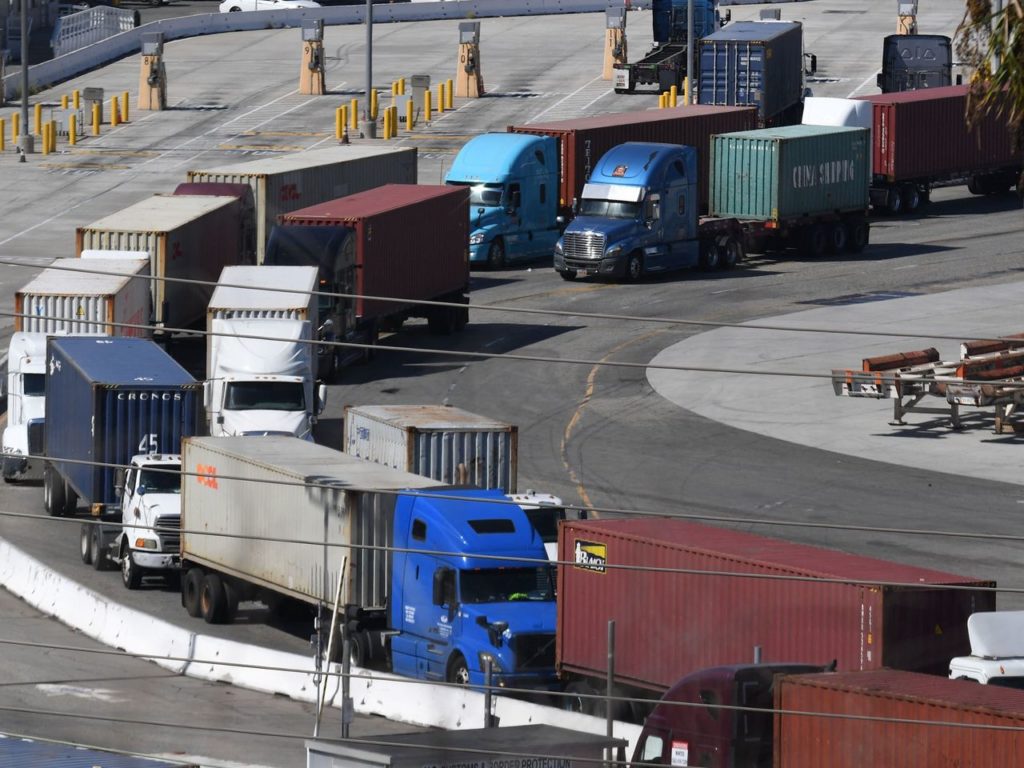Truckers

It’s true enough that truckers through the entire British diaspora are evidently going to lead the revanchist working class violent revolution against decency. But that doesn’t mean truckers don’t have it hard. It’s a shit job and it’s gotten a lot worse over the years. With supply chains issues dominating the headlines, Harold Meyerson reminds us that the way truckers are treated is a big part of the problem.
For the past dozen years, Omar Alvarez has been a key link in the nation’s supply chain. He’s one of some 12,000 truckers who haul the containers from the adjacent ports of Los Angeles and Long Beach (where 40 percent of all the ship-borne imports to the United States arrive) to the immense complex of warehouses 50 miles east of L.A., where the goods are unpacked, resorted, put back on other trucks, and sent to all the Walmarts, Targets, and the like within a thousand-mile radius.
In the course of his daily rounds, Alvarez promotes the general welfare to insure the domestic tranquility of manufacturers, shopkeepers, and consumers. For which the economic system of his grateful country rewards him with … a pittance.
Alvarez works for one of the largest trucking companies at the ports, XPO Logistics, but XPO insists that Alvarez and his fellow truckers aren’t really employees. As far as XPO is concerned, they’re independent contractors and it treats them as such—though they drive XPO trucks they lease from the company or its adjuncts and can’t use those trucks for any other jobs. As independent contractors, they receive no benefits and aren’t covered by minimum-wage statutes. They must pay for their gas, maintenance, rig insurance, and repairs themselves; and, ever since the pandemic clogged the ports with more goods than ever before, they’ve had to wait in lines for as long as four to six uncompensated hours before they can access a container and get it on the road. If they get in the wrong line at the port, they literally can’t get out, surrounded by other trucks and doomed to waste more time. Many ports don’t even provide bathrooms for waiting truckers, because they aren’t port employees.
According to a 2019 study by the Labor Center at the University of California, Berkeley, the median annual pre-tax income of Alvarez and his fellow port truckers, once their expenses are factored in, is a munificent $28,000.
“We have no health insurance,” Alvarez says. Like the majority of port truckers, he’s an immigrant who doesn’t qualify for Medicaid. “When I need to see a doctor,” he says, “I drive [not in his truck] to Tijuana.”
Perhaps one-fifth of port truckers actually are independent contractors; nearly everyone else is, like Alvarez, misclassified as independents. Over the past decade, dozens of lawsuits from misclassified drivers have resulted in judgments affirming that they’ve been misclassified and awarding them compensation from the companies that misclassified them. XPO recently paid a $30 million fine to a large number of its drivers. But neither XPO nor any of the other fined companies have stopped misclassification. It’s cheaper for them to pay a fine than to pay their drivers a living wage.
Not surprisingly, given the long waits and meager rewards, a lot of drivers have simply stopped showing up. According to Gene Seroka, the executive director of the Port of L.A., fully 30 percent of the port’s 12,000 drivers no longer show up on weekdays, a percentage that rises to 50 percent on weekends. Once the waits exceed six hours, as they now sometimes do, drivers would run the risk of exceeding the 11-hour federal limit on trucker workdays if they then were to actually get a load—which means the port must turn them away, and they’ll have spent an entire workday for no pay at all.
And you wonder why the supply chain isn’t working very well?
Heck, maybe if truckers were treated better, they wouldn’t be so susceptible to idiocy.


